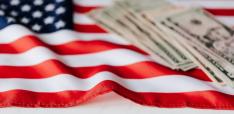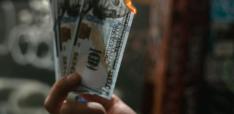Wake Up Obama; The Party's Started
Karl Muth calls on Obama to make more of the positive signals coming from the American economy.
When will Obama realise he's a boom time president? President Obama is presiding over an absolutely miraculous economy – he is a boom time president in any sane description of that term. And it’s time he started acting like it, rather than lamenting unemployment statistics and whining about everything from veteran job prospects to closed factories in the rustbelt. Despite the President’s best efforts to promote gloominess as a political philosophy, those of us actually looking at the American economy have seen a remarkably robust recovery and performance – particularly in equities – that has made hundreds of millions of dollars for Americans (or, as Mr. Obama’s speechwriters like to say, “American families”) across the country. How great has it been these past few years? It’s been amazing. A middle class American family (to use Mr. Obama’s style of examplesmithing) that invested one thousand dollars in an S&P500 index fund five years ago would have $2,194.28 today.
Obama has done several mind-bogglingly strange things during his presidency. These things include taking a very immigrant-unfriendly position (particularly toward skilled immigrants) despite his having enjoyed support among immigrant groups and going from a “green jobs” platform to an “any jobs we can find” platform in what seemed like approximately five minutes and allowing the conservative blogosphere to rename the Affordable Care Act to “Obamacare” in the minds of pretty much everyone (the President has even used this name himself, despite its critical origins). No strangeness of the Obama administration, however, comes close to his seemingly complete ignorance as to the economic boom that has been the defining characteristic of America during his presidency.
Let’s look at the numbers for the Dow.
The day Obama was inaugurated in 2009, the Dow opened at 8,280 and the trading day was uneventful, with the market closing at 8,292. By the day Obama was re-elected in 2012, the Dow opened at 13,114 and had a relatively bullish day (mostly thanks to optimism around news in commodities, particularly oil and gas), ending the day at 13,291. This past Easter weekend (a markets-closed period from Friday to Sunday in New York), the Dow sat at 16,408. That’s right, this past weekend, the Dow Jones Industrial Average was DOUBLE where it sat when Obama took office.
And it’s not just the Dow. High-yield debt has performed surprisingly well (despite predictions of epidemic default rates) during the Obama presidency. The IPO calendar has regained momentum in ways and sectors that no one would have predicted. The level of private equity activity has returned to normal levels, or even enthusiastic levels. The deal velocity for many venture capitalists I talk with is as fast and hot as at any time in recent memory aside from the dot-com boom. Sales of luxury goods are breaking records each year, with high-end fashion houses finding investors on better timelines and terms than ever before. Tesla can hardly keep its $70,000 Model S sedan in stock (the federally-subsidised supersedan might as well be the "official luxury car of Obama campaign donors"), orders for the new Porsche 911/991 Targa have made it the most popular Targa model in twenty-five years, and if you order a Ferrari 458 Spider today you can expect to wait - there are literally hundreds of people ahead of you in the queue (the U.S. has the longest waiting list for the V8 Ferrari convertible).
Some will note that Obama inherited an economy ravaged by a financial crisis, two not-particularly-economically-stimulating wars, and a recently-exploded housing bubble. This is true, but even if we look at FDR’s presidency (which came in the wake of the financially-disastrous Hoover administration, when per capita GDP in America dropped by 29% between 1929 and 1933), Obama’s economy is a truly magnificent one. For comparison’s sake, when Roosevelt took office in March of 1933, the Dow (which had different, but similarly representative, components) was at fifty (like with Obama, the recovery was arguably underway when FDR took office – the Dow was already up from its 1932 low of 41.22). By mid-1938, the Dow was just under one hundred (98.95) and went on (obviously) to trend gently higher for the next few years, including the war years.
There are other parallels beyond economic success. Both Roosevelt and Obama had “first one hundred days” plans to maximise employment and restructure debt of large failing companies (particularly those with a large number of employees in the manufacturing sector). Both pursued several “stimulus” strategies in parallel, even when they were somewhat contradictory from a macroeconomic standpoint. Both focused primarily on public sector employment early in the plan and private sector employment later in the plan. Both had people in key positions that were academically obsessed with earlier crises: Lauchlin Currie was the economic advisor to FDR, having written his dissertation at the London School of Economics under Edwin Cannan on management of macroeconomic turbulence (he later wrote a Ph.D. at Harvard on the role of banks in the macroeconomy); Ben Bernanke reportedly took a deep interest in the Depression as a masters student at Harvard and began during his time as a Ph.D. student at M.I.T. a series of writings that would become published papers on the causes of the Great Depression (and its severity).
Both FDR and Obama have succeeded economically. Both had presidencies that will be remembered for unquestionably robust economic success. Both saw the value of the Dow more than double during their presidencies. Sure, there were areas left behind: Roosevelt’s prosperity never reached west Philadelphia or the near south side of Chicago (both of which have been, in many ways, mortally wounded by the events of the 1930’s) just as Obama’s prosperity has not penetrated into south Detroit or east Los Angeles – but that’s not the point. The point is that the enormous amount of wealth, prosperity, and opportunity that has been a core characteristic of the Obama years has not been harvested in any way. The majority of speeches the President delivers, the majority of the economic reports the White House releases, the majority of the testimony his key advisors offer to Congress all include the same gloomy, out-of-touch, hopelessly cynical appraisal of the “fragile” economic conditions.
Either President Barack Obama is the most humble man ever to hold the office or he and his aides are so politically incompetent that they have squandered an opportunity to tell the story of the largest national economic success in a generation. I suspect it is the latter. You are a boom time president, Mr. Obama. And you should start acting like it. Your current policy and rhetorical posture is beginning to look ridiculous; your relationship with Wall Street is like a man petting a cheetah and reassuring it that it can run. We’ve been running for years; it's about time you noticed.


